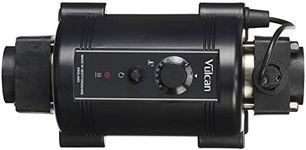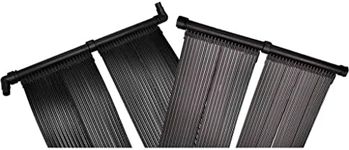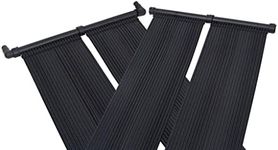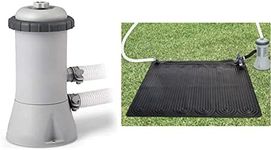Buying Guide for the Best Above Ground Pool Heaters
Choosing the right above-ground pool heater can significantly enhance your swimming experience by maintaining a comfortable water temperature. When selecting a pool heater, it's important to consider various factors such as the size of your pool, your climate, and your preferred heating method. Understanding the key specifications will help you make an informed decision that best suits your needs.Heating CapacityHeating capacity, often measured in BTUs (British Thermal Units), indicates how much heat the heater can produce. This spec is crucial because it determines how quickly and effectively the heater can warm your pool. Smaller pools may require heaters with lower BTUs, while larger pools need higher BTUs for efficient heating. To pick the right one, consider the size of your pool and the desired temperature increase. For example, a pool of up to 10,000 gallons might need a heater with around 50,000 BTUs, whereas larger pools may need heaters with 100,000 BTUs or more.
Type of HeaterThere are several types of pool heaters, including gas heaters, electric heat pumps, and solar heaters. Gas heaters are known for their quick heating capabilities and are ideal for colder climates or for those who want to heat their pool rapidly. Electric heat pumps are energy-efficient and work best in moderate climates, as they rely on ambient air temperature to heat the water. Solar heaters are environmentally friendly and cost-effective in the long run, but they depend on sunny weather and may not be suitable for all regions. Choose the type of heater based on your climate, energy preferences, and how quickly you want your pool to heat up.
Energy EfficiencyEnergy efficiency refers to how effectively a pool heater converts energy into heat. This spec is important because it impacts your operating costs and environmental footprint. Look for heaters with high energy efficiency ratings, which can save you money on energy bills and reduce your carbon footprint. Gas heaters typically have efficiency ratings between 80-95%, while electric heat pumps can have efficiency ratings over 200% due to their ability to transfer heat rather than generate it. Solar heaters are highly efficient as they use renewable energy. Consider your budget for energy costs and your environmental concerns when choosing a heater.
Installation and MaintenanceInstallation and maintenance requirements vary between different types of pool heaters. Gas heaters usually require professional installation and regular maintenance to ensure safe operation. Electric heat pumps are easier to install and maintain but may need occasional servicing. Solar heaters have minimal maintenance needs but require proper installation to maximize efficiency. Think about your willingness to handle installation and maintenance tasks or your ability to hire professionals when selecting a heater. If you prefer a low-maintenance option, solar heaters might be the best choice.
Durability and WarrantyDurability and warranty are important factors to consider as they affect the longevity and reliability of your pool heater. A durable heater will withstand the elements and provide consistent performance over time. Look for heaters made from high-quality materials and with robust construction. Additionally, check the warranty offered by the manufacturer, as a longer warranty period can provide peace of mind and protection against potential issues. Choose a heater with a good balance of durability and warranty to ensure long-term satisfaction.














